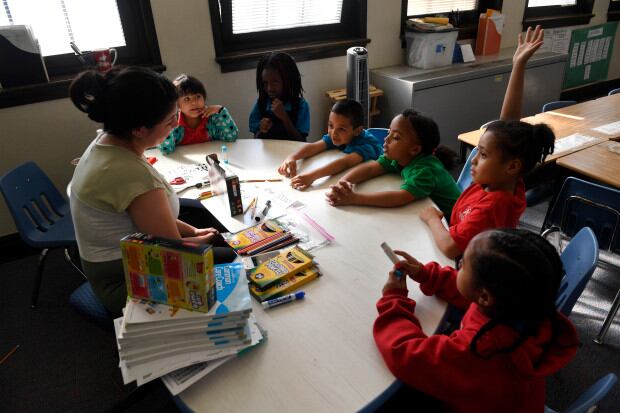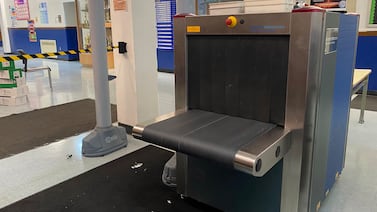In Colorado, families who have the means enroll their children in STEM camps, coding classes, music lessons, and afterschool tutoring — extras that families with tighter budgets struggle to afford.
“Kids are out of school a lot more hours of the day than they are in school, and that world is not equitable,” said Amy Anderson, executive director of RESCHOOL Colorado, a nonprofit that helps families access learning opportunities outside of school. “If you do not have resources or transportation, you don’t have access.”
Proposition 119 on this year’s Colorado ballot aims to close some of that opportunity gap by raising taxes on marijuana and diverting money from state trust lands that support public schools. More than $150 million in estimated new revenue each year would pay for tutoring and other enrichment activities — with priority for children from low-income families — and create a new state agency to oversee it all. The idea has taken on new urgency for proponents as families and children try to recover from pandemic impacts.
Proposition 119 has the support of Gov. Jared Polis, lawmakers of both parties, children’s advocacy groups, and community organizations like the African Leadership Group, Servicios de la Raza, and the Latino Coalition of Weld County — as well as many providers of out-of-school programming that would benefit from new dollars, like the Boys and Girls Club and Outward Bound.
But the measure has divided education groups. Opponents say it’s wrong to stand up a new bureaucracy with a separate funding source when the state has withheld roughly $10 billion from its public schools since the start of the Great Recession. The full text of the ballot measure notes the fund would pay for enrichment activities that are “no longer offered in many schools,” often due to budget cuts.
The Colorado Education Association originally was a partner on the initiative but withdrew its support this summer. The state’s largest teachers union is officially neutral, but the Colorado Association of School Boards, the Colorado Association of School Boards, and the Colorado PTA stand opposed.
“Before we implement a whole other program, why don’t we fund what we’re already obligated to do?” said Matt Cook, director of public policy and advocacy for the Colorado Association of School Boards.
Colorado schools are flush with cash right now from federal relief dollars, but that money won’t last forever. When it goes away, deep structural problems in Colorado school finance will remain. Education advocates have failed repeatedly to persuade Colorado voters to approve new taxes to close the gap — but a proposal in 2019 to raise taxes on nicotine products to fund preschool expansion passed easily. Meanwhile, many Colorado voters mistakenly believe that marijuana taxes already fund education.
Proposition 119 would raise taxes, move money from existing accounts, and set up a new state agency
If approved, taxes on retail marijuana would increase gradually from 15% to 20% in the 2024-25 fiscal year, generating an estimated $137 million a year that would be placed in a special fund.
Proposition 119 also takes more than $20 million a year in state trust land money that would otherwise be invested through the Permanent Fund, and sends it to the Public School Fund for more immediate use. A similar amount of money would be taken from the general fund and transferred to the enrichment program. This shift isn’t cost-neutral, though. A state fiscal analysis estimates if Proposition 119 passes, the Permanent Fund would lose $48 million in interest and capital growth over the next 10 years that could otherwise support public schools.
All this new revenue would be used to provide financial aid to help families pay for academic tutoring, art, music, and dance lessons, second language instruction, targeted assistance for children with disabilities, career and technical training, and other uses. Families living below the poverty line — $26,600 a year for a family of four in 2021 — would have first dibs at up to $1,500 in assistance to pay for classes and camps offered by certified providers, including school districts and charter schools.
The Learning Enrichment and Academic Progress or LEAP program would be run by a new Colorado Learning Authority governed by a 9-member bipartisan board appointed by the governor and separate from the Colorado Department of Education and the elected State Board of Education.
The Colorado Learning Authority would approve providers, determine how funds would be distributed, and implement an evaluation system.
Advocates have wanted more support for out-of-school learning for years
The LEAP initiative traces to RESCHOOL Colorado’s learning dollars initiative. In its early days, RESCHOOL tried to make it easier for families to figure out their afterschool and summer options by setting up websites or connecting families with advocates, but money was always a barrier. Starting in 2015, the group used private philanthropy to make small grants to families. In 2021, RESCHOOL helped 800 kids in six communities around the state with $500 grants.
“I have so many stories of the impact this has had on kids and families,” Anderson said. “Kids have had access to resources that let them get into Denver School of the Arts. You have parents of kids with disabilities who need access to adaptive devices that cost $200 or $300.
“The impact is tremendous with a relatively small amount of money, and it sets kids up for a better future where they can explore the interests that help them become better human beings or meet people who become advocates for them.”
Anderson sees Proposition 119 as a way to bring these same benefits to thousands more families in a sustainable way.
RESCHOOL Colorado started as an initiative of the Donnell-Kay Foundation, a supporter of Proposition 119, before becoming a nonprofit in 2018. (The Donnell-Kay Foundation also provides funding to Chalkbeat. Read more about our supporters and our ethics policy here.)
Proponents have raised more than $2.5 million to pass it, with significant money coming from Gary Community Investments, headed by former state Sen. Mike Johnston, and Ready Colorado, a conservative education advocacy group.
Colorado Children’s Campaign, Colorado Youth Congress, and Colorado Succeeds, which brings together business and education interests, have endorsed the measure. So have organizations that support parents of children with disabilities, like The ARC of Colorado and Firefly Autism, and many organizations that work with youth and families.
The pandemic has made the opportunity gap wider
Joel Newton, executive director of the Edgewater Collective, supports Proposition 119 personally. His organization’s board didn’t take a position.
Edgewater Collective ran learning pods and afterschool programs using grant money last year. The programs were popular, and Newton said families have asked when they’ll offer tutoring again. He won’t know until he hears what the Jeffco district plans to do with its federal relief dollars.
That experience convinced him community groups, which have greater flexibility than districts, need reliable funding for out-of-school programming, and it can’t wait for schools to be fully funded, something that might never happen in Colorado.
“This might be imperfect, but students and families need that extra enrichment and academic support now,” he said. “I want our schools to be fully funded, and families need help now.”
Amie Baca-Oehlert, president of the Colorado Education Association, said her board members ultimately backed away from Proposition 119 because schools already don’t get the money that Colorado’s constitution says they should. But they decided not to oppose it, either.
“There was a big recognition of the need for students to expand their learning,” she said. “We know that need exists and a lot of times our districts don’t have the resources to meet those needs.”
Not everyone’s on board, though.
Marijuana business interests oppose increased taxes and say the state needs to stop treating the industry like a cash cow. Some progressive organizations have likened the initiative to a voucher program, though the measure prohibits money from being used for school tuition or school expenses.
Opponents include labor unions, local Democratic Party chapters, many Democratic lawmakers, and the Working Families Party, which works to elect progressive Democrats.
The State Land Board opposes the ballot measure, stating in a resolution that it would “permanently harm the [Permanent] Fund’s ability to benefit current and future generations of public schools across Colorado.” Revenue from state lands, which were set aside in trust before statehood, support the BEST program, which pays for construction projects in cash-strapped districts, and go toward annual education expenses.
Even people who see the need firsthand have concerns, with Newton noting Edgewater Collective board members had questions about accountability, transparency, and implementation that prevented them from supporting it.
Senate Minority Leader Chris Holbert, a Republican from Douglas County, and state Sen. Julie Gonzales, a progressive leader in the Senate’s Democratic caucus, warned against the “false appeal” of Proposition 119 in an op-ed in the Colorado Springs Gazette. They described it as creating a new slush fund managed by an unaccountable bureaucracy.
Supporters agree the program needs to be set up carefully if it’s going to have the desired effect.
With 20 years in various social service jobs, Sandy Conway of Grand Junction is more used to giving help than getting it. But last year, her husband was laid off from an oil field job, then had a serious motorcycle accident right before he expected to return to work. He spent a month in the hospital and many more months in a wheelchair. During this time, Conway gave birth to a son, then experienced a relapse of her multiple sclerosis.
“We fell on hard times and went from a two-income family to a one-income family with a new baby and lots of health problems,” Conway said.
She was excited to get learning dollars from RESCHOOL to send her 11-year-old stepdaughter to summer camp and wants more families to have that opportunity through Proposition 119.
But Conway struggled to find a participating camp in her area. She ended up using her own money to pay for camp and the grant money to buy arts and crafts materials, school supplies, and a desk chair in case remote learning comes back.
“There wasn’t the work beforehand to make sure we could utilize it,” she said. “I am incredibly grateful to be part of this, and I would love to see it continue, just with a little more forethought.”





